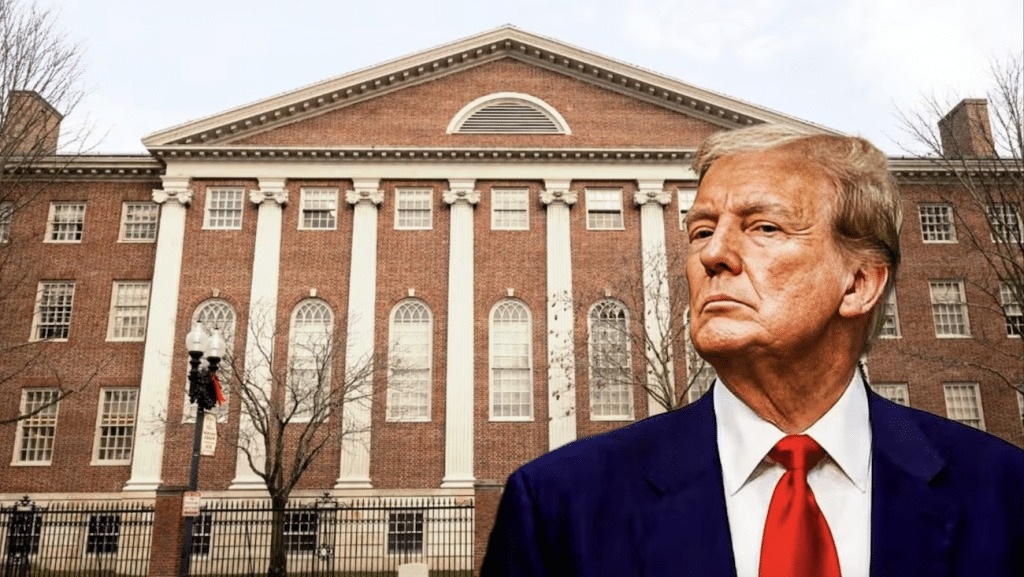Harvard University could lose nearly $500 million a year after losing its tax-exempt status
Recently, Harvard University President Alan Garber announced that the school will not comply with some new requirements that US authorities have placed on the school, for fear that the school will lose its autonomy and independence in making decisions.
In response, the US government quickly froze $2.2 billion in funding and $60 million in contracts signed with Harvard University.
The Trump administration has also asked the Internal Revenue Service (IRS) to revoke Harvard University’s tax-exempt status. If this happens, the consequences for Harvard University will be dire.
Previously, US Secretary of Homeland Security - Ms. Kristi Noem - asked Harvard University to provide records related to a number of foreign students who are believed to be involved in "illegal and violent" activities, the deadline for the school to provide information is April 30.
"If Harvard fails to demonstrate that it is fully complying with its reporting obligations to regulators, the school will lose its right to enroll international students," Noem said.
A Harvard University spokesperson confirmed receipt of Noem's letter and said the school "will not give up its right to make independent decisions" and remains committed to complying with US law.
Bruce Kimball, a lecturer in philosophy and history of education at Ohio State University, told CNBC that being tax-exempt means Harvard University does not have to pay income tax on its investments. At the same time, donors who cooperate with the school also get tax deductions.
Bloomberg (US) financial magazine estimates that the tax exemption will bring Harvard University a profit of more than 465 million USD in 2023.
In the US, organizations can lose their tax-exempt status if the IRS determines they engage in activities that express extreme political views, or generate too much income from activities unrelated to their core mission.
Very few universities in the United States have ever had their tax exemptions revoked. In one rare case, Bob Jones University had its tax exemption revoked in 1983 because of its racist practices.
White House spokesman Harrison Fields told US media that the IRS had begun investigating Harvard University before US President Donald Trump suggested that Harvard University should be taxed.
Currently, a Harvard University spokesperson confirmed to the US media that the Government has "no legal basis" to revoke the school's tax-exempt privilege.
"The U.S. government has long provided tax exemptions to universities to support their educational mission. Removing Harvard's tax exemption would undermine our ability to carry out our educational mission.
"We could cut student financial aid, shut down vital medical research, and even lose opportunities for educational innovation. Misuse of the tax tool could have serious consequences for the future of American higher education," Harvard University said in a letter to CNBC .

The administration of US President Donald Trump has asked the US Internal Revenue Service to remove Harvard University's tax-exempt status (Illustration: CNBC).
With an endowment fund of up to 52 billion USD, but Harvard University is not easy to "break the piggy bank"
Not stopping there, the administration of US President Donald Trump also threatened that Harvard University could lose the right to recruit foreign students if it does not fulfill its responsibility to report necessary information to the authorities.
International students now make up more than 25% of Harvard University's total student population. However, unlike many other schools, Harvard University is less financially dependent on international students, as the school enjoys a wide range of financial aid policies.
Harvard representatives declined to comment on the federal government’s decision to cut off some of its funding and investments through contracts with the school. However, two lawyers representing the school — Robert Hur and William Burck — sent a letter to the federal government questioning the legality of the actions authorities are taking against the school.
As the richest university in the United States, Harvard University is said to have the resources to fight a protracted legal battle. However, according to analysts in the United States, the school's huge assets are not a "piggy bank" that can be easily broken and spent as desired.
Harvard University’s endowment is now nearly $52 billion, according to a study by the National Association of University Administrators (NACUBO). The school’s most recent annual financial report showed that the endowment returned 9.6 percent over the past year.
Founded in 1636, Harvard University has amassed the largest endowment of any university in the United States. It also has a strong donor network. In 2024, $368 million was added to the university's endowment.
Despite its large endowment, Harvard University will not be able to spend this huge sum of money at will. In the endowments of universities in the US, there are hundreds, even thousands of small funds, most of which are bound by the direction of use, set by the donor, such as funding scholarships, supporting lecturer salaries or funding research...
Harvard University currently has about 14,600 small endowments, of which 80% are restricted in their use. In the last fiscal year, the university's endowment disbursed $2.4 billion, 70% of which was used according to the donor's intended use.
"Most of the money spent has a specific purpose. Universities cannot arbitrarily 'break their piggy banks' to spend as they please," former President of the University of Pennsylvania (USA) - Mr. Scott Bok - affirmed.

The administration of US President Donald Trump also threatened that Harvard University could lose the right to recruit foreign students (Illustration photo: CNBC).
What is Harvard University doing to maintain financial stability in the current context?
Harvard University currently has $9.6 billion in endowment funds that are not tied to donor-specified uses. The school's financial statements state: "The school has no intention of using this asset, but the asset may be spent if an unexpected problem arises."
The $9.6 billion endowment represents nearly 20% of Harvard’s total endowment, but spending the funds would hurt the university’s future cash flow because it would have less capital to make profitable investments.
Harvard University has declined to comment to the US media on whether it will increase its endowment spending. Like most other schools, Harvard aims to spend about 5% of its total endowment each year, which is considered a reasonable spending limit to help the endowment continue to grow and cope well with inflation.
Harvard University is currently reviewing its operating budget. In mid-March, the school began implementing austerity measures, including a hiring freeze and restrictions on accepting new graduate students.
According to CNBC
Source: https://dantri.com.vn/giao-duc/the-kho-cua-dai-hoc-harvard-khi-doi-dau-tong-thong-my-donald-trump-20250418131550140.htm



![[Photo] General Secretary To Lam arrives in Minsk, begins state visit to Belarus](https://vphoto.vietnam.vn/thumb/1200x675/vietnam/resource/IMAGE/2025/5/11/76602f587468437f8b5b7104495f444d)
![[Photo] General Secretary To Lam meets and expresses gratitude to Vietnam's Belarusian friends](https://vphoto.vietnam.vn/thumb/1200x675/vietnam/resource/IMAGE/2025/5/11/c515ee2054c54a87aa8a7cb520f2fa6e)





















![[Photo] General Secretary To Lam concludes visit to Russia, departs for Belarus](https://vphoto.vietnam.vn/thumb/1200x675/vietnam/resource/IMAGE/2025/5/11/0acf1081a95e4b1d9886c67fdafd95ed)


































































Comment (0)